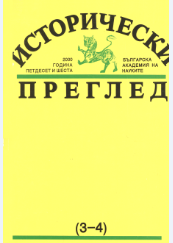Германската академия в Мюнхен и нейните лекторати в България (1925–1944)
German Academy in Munich and Its Lectureship in Bulgaria (1925–1944)
Author(s): Elena BoyadjievaSubject(s): History, Cultural history, Recent History (1900 till today), Interwar Period (1920 - 1939), WW II and following years (1940 - 1949), Fascism, Nazism and WW II
Published by: Институт за исторически изследвания - Българска академия на науките
Keywords: Südostforschung / Southeast European Research; German national spirit; German Academy in Munich; German Academy in Sofia; German Kulturetrager
Summary/Abstract: From the mid-20s of the past century Germany’s growing interest in the European Southeast led to the appearance of a new branch in German science: Südostforschung (Southeast European Research). The first link in its institutional network was the German Academy in Munich. Although founded to support the German national spirit (Deutschtum) abroad, almost from its very beginning it was directed to the Southeast European region - the objective of German economic and cultural strivings. The work of the Bulgarian Academy developed in two directions: a) scientific research (and popularization) - studying the targets of influence; b) “export” of the German language and German culture. The tasks in the second direction were entrusted to the local lectureships. After opening the Mediation Bureau (Mittelstelle) of the German Academy in Sofia, it was proceeded with the setting up of the lectureships. While the German schools spread the language among the children and youths in Bulgaria, the lectureships had to include the adult people. In the course of a decade were opened 12 lectureships with 15 branches, the number of those attending them exceeding 4000. Only one-quarter of them, however, met the requirements of the German Kulturetrager, namely to attract chiefly German language lecturers, including students. For various reasons of an objective or subjective character, the lectureships of the German Academy failed to achieve the superiority, so keenly desired by Berlin, over French linguistic and cultural propaganda. At the same time, they did not prove as effective, as was expected of them, in disseminating the Nazi ideas.
Journal: Исторически преглед
- Issue Year: 2000
- Issue No: 3-4
- Page Range: 90-111
- Page Count: 22
- Language: Bulgarian
- Content File-PDF

